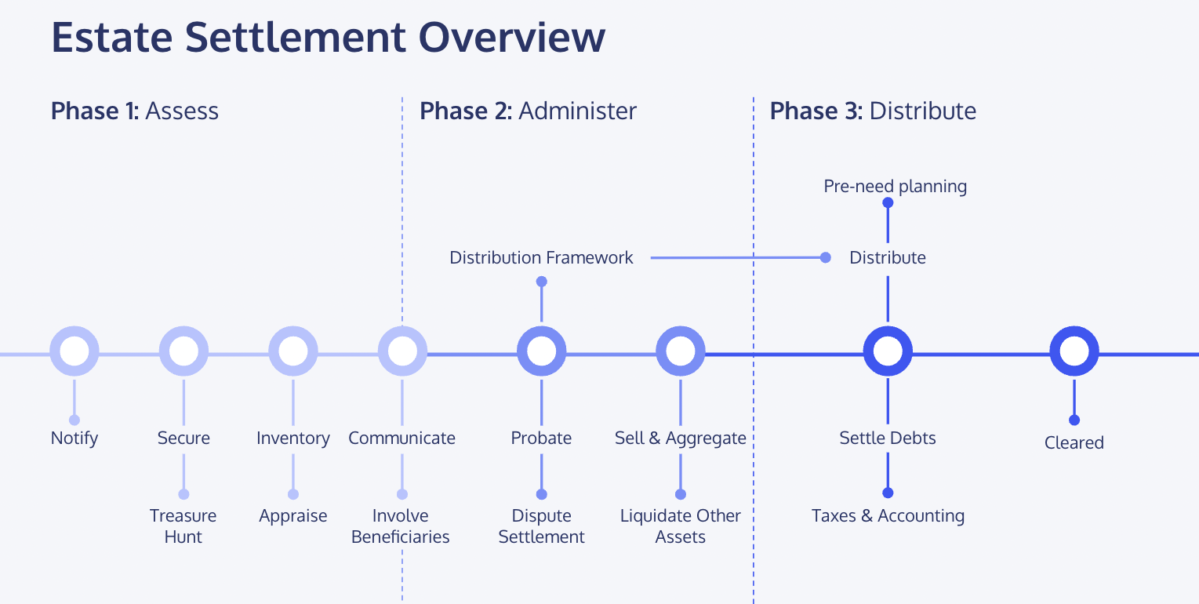Estate Settlement
Dec 04, 2024
How Do Executors Mail Inheritance Checks?
Find out how inheritance checks are mailed, including security measures and what to do if there are delays in receiving them.
Get the answers you need about probate in Ontario. Our comprehensive FAQ guide has everything you need to know.


Article Contents
Simply put, probate is the legal process in which the will is proved in court as the deceased’s “true last living testament” and could take more time than you think. This process can lead to unforeseen costs and possibly, legal delays - especially if the deceased passed away with no estate plan in place before their death, or if the estate is a complicated one.
The probate process, as illustrated, is not a free one. Probate fees, commonly referred to as estate administration tax, are charged after the probate court has validated the deceased’s will and independently evaluated all their assets.
In Ontario, probate is required when a deceased person's assets are held in their sole name. This includes assets such as real estate, bank accounts, investments, and personal property. If the assets are jointly held with someone else, probate may not be required.
While avoiding probate in Ontario is rare, there are certain instances where this legal process is not necessary. One instance where probate is not required in Ontario is when the estate is passing from “the first spouse to die to their partner.”
The deceased must have named their spouse as the beneficiary on all investment, banking and retirement accounts as well as life insurance policies and pension plans and created a joint right of survivorship for the property. In this case, there would be no estate to evaluate as all assets have already been distributed to either spouse.
If the estate is passing from one generation to another (parent to children), by contrast, then the probate process is typically required in Ontario. Finally, if a financial institution where funds are held demand probate in Ontario, then the probate process is required.
Losing a loved one is never easy, and as if that wasn't enough, the process of probating their will can often seem overwhelming and confusing.
As the executor, you are responsible for handling their affairs and ensuring their wishes are carried out, which can be a daunting task.
But rest assured, you're not alone. In this post, we'll walk you through the steps you need to take to probate a will in Ontario, so you can have the knowledge and guidance to navigate this difficult time with confidence.
It's important to note that this process can take several months, even up to a year or more, depending on the complexity of the estate.

To value assets for probate in Ontario, the executor is responsible for obtaining accurate, impartial professional appraisals of all assets in the estate as of the date of death.
Here are some standard methods for valuing assets for probate in Ontario:
It's important to note that assets like real estate and business assets may require more detailed and professional appraisals.
And also, the executor must provide the court with a sworn statement of assets and liabilities - this document is called the estate information return. Which includes the valuations of all assets in the estate, as part of the probate process.
Probating a will in Ontario can be a complex process, and while it is not legally required to have a lawyer, it is highly recommended. A lawyer can guide you through the process, help you with the paperwork, and represent you in court if necessary.
However, it's important to note that some lawyers may not always have the availability to take on probate cases, or their fees may be prohibitively expensive, with some even charging a percentage of the estate as payment.
In such situations, it's important to consider other options such as hiring probate professionals like ClearEstate that charge a simple flat rate fee - We can provide guidance and help you through the entire probate process, without the high fees.
While Ontario's supreme court does not exactly have a hard deadline for an estate to be settled, it is generally expected that the estate trustee will settle the estate completely within 1 to 2 years after obtaining the certificate of appointment.
The length of time it takes to settle an estate can depend on various factors, such as the complexity of the estate, the availability of assets, and any disputes that may arise.
We have a full detailed blog post on this very topic here:
Settling an estate is tough enough - but settling an estate with assets outside of Ontario can add to the stress and myriad of tasks you need to do as a trustee.
Here is how you can deal with out of province, or out of country assets that are a part of the deceased's estate:
Identify the assets: The first step is to identify all assets that are located outside of Ontario. This may include real estate, bank accounts, investments, and personal property.
Determine the laws that apply: Each country or state has its own laws and regulations regarding probate and the distribution of assets. It's important to understand the laws that apply to each asset and how they may affect the probate process.
Obtain professional help: Depending on the laws and regulations of the country or state where the assets are located, it may be necessary to obtain professional help from a lawyer or other legal professional who is familiar with the laws in that jurisdiction.
File the necessary documents: Depending on the jurisdiction where the assets are located, it may be necessary to file the necessary documents to probate the will and transfer the assets to the beneficiaries.
Report the assets to the tax authorities: The estate trustee must report the assets located outside of Ontario to the tax authorities of the respective countries or states where the assets are located, and also to the Canadian tax authorities.
Coordinate with other executors: If assets are located in different jurisdictions, you may need to coordinate with other executors that have been appointed in those jurisdictions to ensure that the assets are distributed according to the will.
Follow the laws of the jurisdiction where the assets are located
To handle the sale of real estate or other assets that are part of the estate, you will need to follow these steps:
If you're an estate trustee in Ontario, the probate process can be overwhelming and confusing. That's why we highly recommend getting professional help. Our experienced probate experts can guide you through the entire process, ensuring everything is done correctly and efficiently.
By scheduling a free, no-obligation consultation with us, you'll have peace of mind knowing that you are in good hands. We'll assist you with obtaining a certificate of appointment of an estate trustee, managing and distributing the assets of the estate, and ensuring that all requirements are met.
Don't let the probate process stress you out. Contact us today to schedule your consultation and let us help you with all your probate needs.
With our help, you can ensure that the wishes of the deceased are carried out and that the assets are distributed according to the terms of the will or the laws of intestacy. Trust us to handle the complex legal process so that you can focus on your loved ones and move forward.
 Simplify Probate Today
Simplify Probate Today
Get expert guidance from our probate specialists who've helped 10,000+ families.
Book a free consultation today